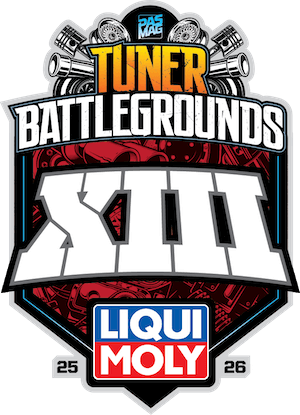We sat down with Bulletproof Automotive boss Ben Schaffer, North America's authority on all things JDM, to really just get an answer to what this whole JDM thing is about. Mr. Schaffer is a super passionate individual, especially about this topic, and had a lot to say. Here you can read the original interview, as well as some tasty bonus ones that we didn't have room for in the pages of our JDM Special Edition book!
PASMAG: Why do you think JDM became so big in North America, and why do you think it’s stayed so big?
Ben Shaeffer: I think there has always been a demand for innovation and well-thought-out products. If there was an increase in demand, it would be only based on a few factors: one being education. For someone to know why one exhaust is higher quality than the other, they would have to be taught that information by someone. You can say that it grew because people’s own knowledge about car tuning has increased with the Internet and information comes from Japan to North America more freely. In other words, I don’t think people’s tastes have changed, I just think that people would think that high quality, innovative, cool stuff was awesome 15 years ago, just like they do now. The difference is now they can learn about it and they can understand it and they can get access to it. Quality is timeless.
Would you say that’s true across the board with Japanese parts – that they are higher in quality than product here – or has it been a catch-up game on our part?
I think there are certain categories of tuning that the Japanese excel at compared to the US. Most people would say that the quality of aero parts, exterior components and carbon fiber components far surpass whatever’s going on in the US aftermarket. However, the opposite could be said of engine tuning. If you talk about drag racing, the quality of drag racing parts in the US far exceeds what’s going on in Japan. It’s not necessarily that everything made in Japan is the best quality, it’s that certain categories of Japanese quality is leading. American horsepower tuning on Japanese cars has come a long way in the past 15 years. If you look at drag race results, cars in the US made by US tuners are outperforming Japanese cars. Drag racing is the hamburger culture and the circuit and aerodynamics are the sushi culture. Americans make a better hamburger and Japanese make better sushi.
Great analogy! Why is it that the Japanese make much better “sushi” in this case?
I spent a lot of time in Japan, I studied out there, went to school for a bit, and I’ve been back and forth for about 15 years. The one thing that I personally found about Japanese culture is that they dive very deep into their hobbies and into their passions. When you see someone who does something as a career, it’s not, “Let me try this for a little bit and then do something else.” It’s a lifelong profession and they work their entire lives to perfect the last 0.001 percent. You see it in all areas of the culture over there, especially food. The quality of food in Japan is incredible because someone who makes soba noodles makes soba noodles their whole life, maybe their father made them his whole life, and they live and breathe soba noodles. This is the story for every element of their culture; there are people who have a dedication to their craft that goes deep. Would you say this translates to the enthusiasts and customers as well?It’s the exact same for the customers. I kind of consider it is being an “otaku” or connoisseur. The premise of being a connoisseur means that you don’t just love it at face value, you dive deep and you learn about it. You constantly strive to enjoy it and to experience it and to learn about it at the deepest depths possible. In Japan, it seems like that’s widespread. People in Japan who are into cars are really into cars. When you have customers and people in a culture that obsess over details that are so exciting to them, and at the same time you have manufacturers that look at what they do as a lifetime art form, those two things combine into what is Japanese tuning.
What is the process of bringing in these parts and distributing them like at Bulletproof?
It’s pretty easy now because we’ve been doing it for so long. It basically involves a ton of relationships on the supply side. We’ve never dealt with the companies that were huge and already doing it themselves, we’ve always fought for the little guys that are usually less than 10 people as a company, maybe have nobody who speaks English, and would have no idea how to explain their brand to an overseas market, nevermind how to ship it there. We manage those relationships with a great deal of care and respect because they are very important to us. Logistics-wise, we keep a warehouse in Yokohama, which is near to the major port. Whatever we order, it gets shipped to our warehouse and our warehouse stages the items and then we ship the container. The one thing that’s unique about us is we ship our containers on a fixed schedule, regardless of whether they are empty or full. We willingly pay to ship empty air in our containers just to get products faster. Most companies have a model where they will hold the container shipment until it’s full to the brim, which is great for their bank accounts, but that sometimes means that containers can sit for a month or longer.
Seeing as you deal with a ton of parts from Japan, is everything stamped with “JDM” golden, or are there some misconceptions that maybe some enthusiasts wouldn’t be aware of?
I think there’s a lot. The theory of JDM tuning being a trend is really wrong. Japanese tuning is a philosophy; you have to think about what it stands for and what it represents. When people say, “Oh, my car’s JDM,” and they end their sentence right there, they’re missing the whole point. The point is not where the part is manufactured; the point is what the part stands for. What does the quality stand for? What does the company that makes it stand for? We all know “JDM” stands for Japanese Domestic Market – that’s indisputable – but not everything has to be made in Japan. For example: Top Secret shocks are made in Europe and their steering wheels are made in Italy, not in Japan. Is the Top Secret steering wheel Japanese? It’s debatable. Is Top Secret a JDM tuning company? Yes. When people just say, “That’s JDM,” that’s a really surface level impression that can be really misleading and steer people in the wrong direction.
That being said, which manufacturer’s parts would you say are ones that you’re always pleasantly surprised with and resonate the most with your JDM philosophy?
I’m really lucky to be able to answer that question with actions and not words, and I’ll explain why. I started this business 15 years ago. The only Japanese tuning brands that were officially represented in the US were the biggest ones out there - the HKSs, GReddys and companies of that size. Those brands were already set up. Everything else that ever occurred back then, and going forward for the next 15 years, I pretty much had first shot at. I could essentially pick and choose which brands that I wanted to talk to and represent because there wasn’t anybody taking them seriously in North America. So, if you say which brands excite me, I’ve pretty much been able to choose those brands and distribute for them.
What would you say are some of the biggest trends you’ve noticed coming out of the JDM scene in the past couple of years?
Quality is always increasing. That’s something that’s not a trend, that’s just an ever-present fact about Japanese culture. The Japanese invented the term “kaizen,” which means to always make incremental improvements every day. Trend-wise, I think the aerodynamics are getting super functional, which means they’re getting super impractical for street cars. It used to be that if you had a GT wing, that was as much as you could get, then it was canards, then twin canards, and then it was a bigger front diffuser. Now if you look at some of the cars that are running time attack in Japan, it’s on a whole different level than I ever imagined it was going be.
Do you have anything that you’d like to leave the readers with?
If someone takes away, “Oh, JDM is cool because it’s made in Japan, I want JDM,” they’ve missed the whole point. If people can walk away from this with any value, I would hope the value would be to learn for themselves about what quality is. Try to figure out what being a connoisseur or an “otaku” means - that dedication to learn about every nook and cranny on the parts you’re putting on your car, how you’re building your car, and what your car represents as a cohesive statement of your own philosophy. I’d like to see an outcome of JDM being a lifetime pursuit and dedication to whatever someone’s interests, hobby, craft or career is. That’s what JDM is.
Obviously you’ve got a huge passion for not only the car scene, but for the Japanese culture as a whole. Where did that kind of fascination start for you?
It probably started with cars. I know when I was young I was always into cars, and the first time I got my hands on an Option Car magazine - which is Japan’s top car magazine - was in the mid 90’s and it was really hard to come by at that time. There wasn’t anything online obviously, there wasn’t anything covering the scene. There’s something magical about finding something awesome that you didn’t think existed. That was the world pre-100-million-blogs. That was the world when you actually could discover something. I was going through Option Magazine and I was studying every page because everything was completely new to me, as far as the brands, the products, the styling and what they were doing. Everything was so fascinating. It was then that I was just like, “How do I get another one of these magazines?” Then I found Option and Best Motoring videos. I was struggling to find stores that had used copies of them on VHS cassette, just to figure out what the hell was going on in them. It was a treasure hunt back then because the information wasn’t there.
How has that access to information changed the game to you?
The internet and the industry have evolved. On the one hand, it’s great that it’s democratised and the whole world has the same advantage and access as the local guy in a suburb in Japan. Everyone is on a level playing field to be able to get parts, and as a result, overall quality of car tuning around the world has increased massively because people aren’t limited to whatever local junk they have. They can get the best parts anywhere in the world, shipped anywhere in the world, to anywhere in the world. That’s a huge advantage that made every person’s custom car better. But there’s almost no mystery left anymore. Everything is online, everything is accessible and everything is everywhere. For me, the early stages were magical. It was really discovering something new that no one ever told me existed. I just wanted as much as I could, to learn more and dive deeper into it, and that took me to Japan. I was living out there for a little bit and studying out there, and I just got hooked.
Did that lead to The Real JDM?
I started Bulletproof in March of 2000. I was a student at the time and did it while I was in college. My first container of imported parts from Japan was in 2001. I didn’t start writing The Real JDM until 2006. At that point in time, we had started to be known for finding really cool things out of Japan and bringing them to the US. In a way, a lot of my job was trying to find and identify high quality, great things that no one had seen and to represent those brands and represent those products. My job back then, and still my job today, is to curate awesome content.
Modified Magazine was looking for unique content and they looked to me to tell them what were the trends and the interesting topics in the Japanese tuning world that would likely be next for the US. The nature of The Real JDM as a column was me having an opportunity to share with whoever wanted to read it, what I saw as being the most interesting topics of the day. The deal I had with Modified was that I had full creative control, so whatever I thought was cool I just said it.
It worked out well for a while. I had a two year run writing that. The challenge I have with writing for magazines is that it’s a lonely profession because you don’t know who is reading and you have no feedback from the other side. I felt that after two years, I was talking to the same mysterious people that never talk back and it just lost its excitement. At that point, I switched over to blogging, which was a lot of fun because then I’d get comments from people telling me I’m an asshole or telling me they’re frustrated or whatever - it was totally unmeasured. That was fun because at least you knew that a topic was creating a conversation. To me, there’s no point in talking unless there’s a two-way conversation, which is why I stopped writing and I haven’t really done writing since. I like having the conversation and I like inspiring others and having others inspire me. The sharing of ideas, that’s fun.
What kind of a philosophy do you follow when you build your company cars?
Once you can distinguish the difference between quality and a trend, you can distinguish which brands are gonna survive for 10 years and which cars you’re going to look back on with high regard versus ones you’re going to look back on with embarrassment. That’s one of the things that we try to really embody in the cars that we build. We actually just went to a car show last weekend and we had a great experience. We ended up winning 1st and 2nd place, which was pretty amazing. From a car show perspective, the best award I ever won was for my S2000 in 2012. I won the category with the car that hadn’t been touched or modified for five years prior. It was a 2007 SEMA car we had. It’s not a fashion statement, it’s not a trend and you don’t look back at it and say, “Oh I wish I hadn’t done that.” That car made in ‘07 made sense in 2012 and I try to build every car so in 10 years I can look back and say that was still the best car that I could do.
Which cars best represent your largest customer base?
Far and away, the GT-R is our biggest market and that’s always been the background of the business. I began the company most interested and focused in the GT-R. Granted, the S2000 was how I started the business - the S2000 was an early passion - but, if the US had been fortunate enough to have had a GT-R back in the year 2000, we would’ve started as a GT-R company. In 2003, we were representing brands like Top Secret. Their whole business was focused around GT-Rs and we couldn’t sell any parts because we didn’t have any GT-Rs here. The GT-R has always been a very important car for Japanese tuning. A GT-R is to Japan, what the Corvette is to America in terms of being an iconic car. It always has been.
Photography supplied by Bulletproof Automotive.
For more information on Bulletproof Automotive, go to https://www.bulletproofautomotive.com.
Related Articles
 A Proper Full-Time Daily - Thanongdeth Chanthavong's 1999 Nissan Skyline
A Proper Full-Time Daily - Thanongdeth Chanthavong's 1999 Nissan Skyline
 Father of the GT-R, Kazutoshi Mizuno, Announces Limited Book
Father of the GT-R, Kazutoshi Mizuno, Announces Limited Book
 SEMA 2023: AMS Performance Alpha Z + Booth
SEMA 2023: AMS Performance Alpha Z + Booth
 Unleashing The Dragon: Jimmy Tu's R35 GT-R
Unleashing The Dragon: Jimmy Tu's R35 GT-R
 Liberty Walk LB Works A90 Supra Widebody Kit
Liberty Walk LB Works A90 Supra Widebody Kit
 Air Lift Performance-Series Kits for 2023 Nissan Z
Air Lift Performance-Series Kits for 2023 Nissan Z













